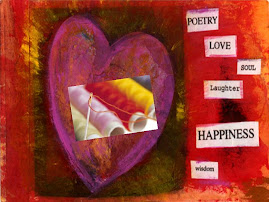 When your heart is hurting, it’s difficult to imagine that, eventually, the pain will give way to expansion and more love. After all, the heart is a muscle. Use it or lose it. The more you love, the more you develop your capacity for love. If we’re smart, we will love aerobically, pumping our heart to its fullest potential.
When your heart is hurting, it’s difficult to imagine that, eventually, the pain will give way to expansion and more love. After all, the heart is a muscle. Use it or lose it. The more you love, the more you develop your capacity for love. If we’re smart, we will love aerobically, pumping our heart to its fullest potential.In the past eight months, I have lost five beloved people and pets: a cousin, a cat, a dog, a nephew, and just this week, my sister Lori. When it rains, it pours. If that’s true, I am overdue for a lot of sunny days to compensate. We are promised that after sorrow comes joy.
But the truth is, the longer we live, the more we will have to let go of people we love. The older we get, the older our relatives—the more people run out of sand in their hourglass.
Loss is the flip side of love. Even if a relationship endures, one person will normally die first. (Perhaps it is a real blessing to go together.) Would I give up one second of a relationship for the pain of loss? No way. I hope you feel the same.
My sister and I were closer as children than we were as adults. We grew up to be who we really are, which is quite different from one other. My first husband used to say we were like salt and pepper. (I probably don’t have to tell you who was pepper.) Until I reached a more mature understanding, I used to mourn the fact that we didn’t have the ideal best-friend relationship some sisters enjoy.
It stands to reason. We are not related by biology and the first ten years of our lives were as different as day and night. Everyone in my crazy quilt family was adopted or a long-term foster child. My sisters are foster to me (informally adopted, really), but biological to each other. Still, my sisters, even with their genes in common, were totally unique. The ways in which they were alike—physical resemblance, gestures, tone of voice, the way they moved—was a kick to observe.
Never did our differences mean that we didn’t love each other. We were always there for one another, and the time we spent together, even if it wasn’t frequent, was treasured. It honored our shared history and being reared by two of the most one-of-a-kind parents on the planet. The ones who took in stray cats, dogs, and children.
As the shock wears off, the grief is sharper, but it is buffered by my incredible network of family and friends. In two days, I have had nearly 70 e-mails, cards, and phone calls. I am both comforted down to my toes and a bit embarrassed—embarrassed that I often don’t “feel the love” in everyday life. Often I actually feel unplugged from people, a feeling that is clearly “my problem” when you consider the shower of support and expressions of love in my time of need. The last time I felt this much support was during a serious health crisis in 1992. I hate to think that I only allow myself to feel my powerful connection with people when I’m in high drama.
While I understand the psychology of this sense of alienation in myself to a large degree, what I’d like to understand better is how to feel that link more strongly on an everyday basis. I think it has something to do with opening my eyes in a new way and simply learning better how to let love in. This often has to do with our own sense of worthiness and our right to be here, that wonderful line from the Desiderata.
The unexpected loss of someone you love is a blaring reminder that we should live life to the fullest, all the way to the finish line—the message of Hot Flashbacks, Cool Insights—both the book and blog. Or as I say in the Foreword:
Let’s create a web of seasoned citizens who tell our tales like wise grandmothers and grandfathers we are and play like children till we drop.
May you feel the love every moment of every day.
***
Photo: My sister Lori, October 2007
















1 comment:
Joycie - what a great piece! Thanks for sharing this, in our pain we sometimes can express some of our greatest works in words! I love Desiderada - we used it at my Granny's service way back in 1982!
Jessica
Post a Comment